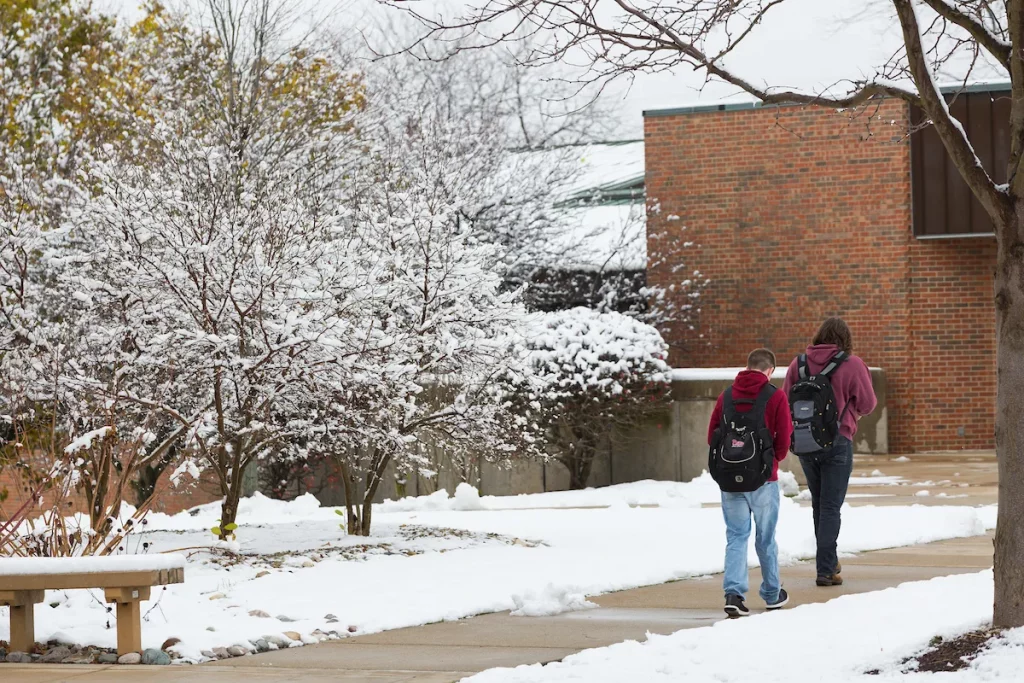Undergraduate Research Tackles Student Wellness
At Valpo, our students are not afraid of taking the lead on advanced academic endeavors, and they are always looking to learn something new. And something that is uniquely Valpo is their opportunity for undergraduate research. We know that the best way to prepare our students for the rigor of research in their fields of study is to simply allow them to do it right here on campus.
“The research that our students are doing in the College of Nursing and Health Professions is graduate level research,” says Theresa Kessler, Ph.D., RN, ACNS-BC, CNE, FAAN, Kreft Endowed Chair for the Advancement of Nursing Science. “We treat our students like professionals and I am so impressed by their work. They are eager to learn and ready to put the concepts they learn into practice.”
A team of undergraduate researchers at the College of Nursing and Health Professions took part in a project that focused on assessing blood pressure in relation to overall health and well-being on campus. Their research consisted of assessing factors such as stressors, caffeine intake, alcohol consumption, food and exercise habits, and then collecting students’ blood pressures for assessment. They aim to spread awareness about hypertension and educate the campus community on the risk factors in order to improve their overall health. The time and effort that was required to gather data, analyze their findings and understand what it all meant in relation to their initial focus was no easy task, but hard work definitely pays off.
“Research is such a rewarding experience,” says Bryn Benzing ’25. “Getting to be involved with peers, professors, and the University is a vital part of creating leadership skills and growing academically. I understand that joining can be nerve wracking, but getting to research a topic that interests you is such a rewarding experience!”
The undergraduate students involved were advised by Professor Kessler, as well as Lynette Rayman, DNP, RN, CNE, assistant dean of undergraduate nursing, but the students did the bulk of the data gathering and translating on their own.
“The skills that they are learning through doing this research are skills that will easily translate into their careers later on,” Professor Rayman said. “If they choose to practice as nurses in a hospital setting, they will be able to give their patients clear backgrounds about specific issues in the medical field because they know how to do the research.”
Not only did the students who participated in this research gain skills that will help them in their college careers and beyond, they found out more about an issue that they did not expect to be prevalent in a campus community, specifically with a younger population.
“The most surprising result that I think we have found through our research is that many college students are unaware of what hypertension is and what a normal blood pressure reading is,” says Adalynn Harper ‘25. “Our results can help to better the campus community by making students aware of normal blood pressure readings and educating students on what hypertension is. And that is satisfying to me because it’s a direct impact that we are involved in.”
Undergraduate research opportunities allow for students to work beyond themselves and collaborate with a team to produce worthwhile findings. The environment that these students found themselves in was one that required attention to detail, accuracy and overall dedication to the cause of the project.
“I enjoy being a part of an undergraduate research team because it is a group process,” says Isabella Dietrich ’24. “Everyone contributes and is invested in the results of our research, so it is a great environment if you do feel nervous about doing research alone.”
The opportunities that our students are afforded through undergraduate research are key parts of our overall dedication to a top-tier educational experience. The College of Nursing and Health Professions has embodied the themes of Uplift Valpo, our University’s five-year strategic plan, by allowing students to Learn in the most immersive way, Lead through their research endeavors, and Thrive with their new found confidence after successfully completing research that truly made a tangible impact on their community.


